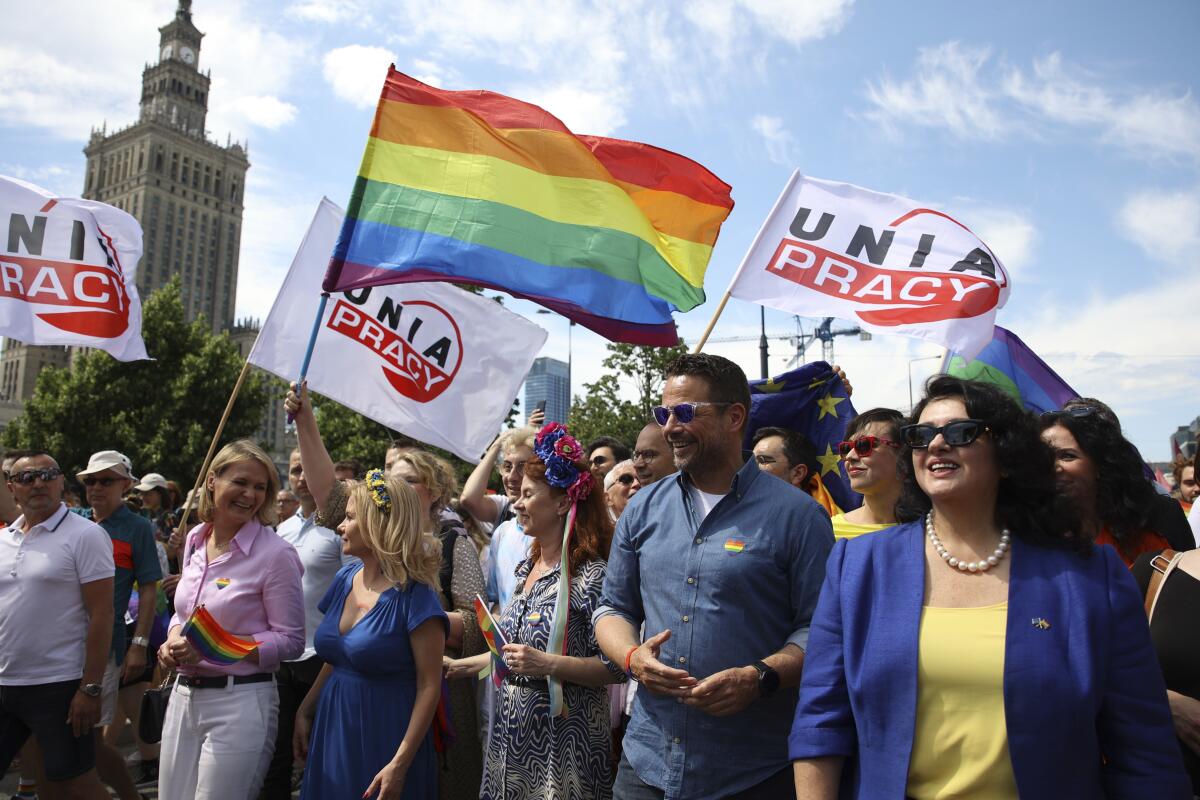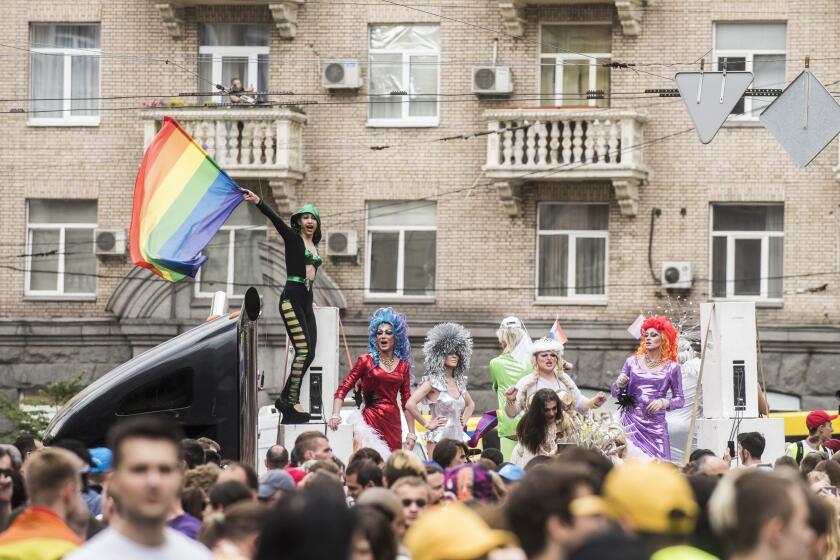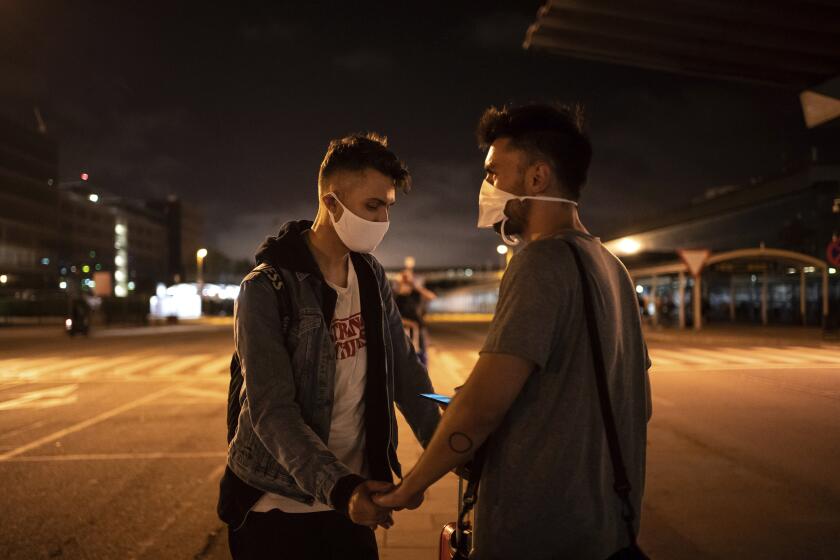War turns Kyiv’s pride parade into a peace march in Warsaw

- Share via
WARSAW — Ukraine’s largest LGBTQ rights event, KyivPride, went ahead Saturday, although not on its native streets or as a celebration.
Because of Russia’s war in Ukraine, the event normally held in Kyiv, the capital, took place in conjunction with Warsaw’s yearly Equality Parade, the largest gay pride event in Central Europe, with Ukrainian organizers using it as a platform to keep international attention focused on their country’s struggle.
About 300 people traveled from Ukraine to the Polish capital, now home to a quarter-million Ukrainians who fled the war. Blue-and-yellow Ukrainian flags fluttered among a sea of rainbow flags, and some participants chanted “Slava Ukraini” — glory to Ukraine.
“Unfortunately, we cannot march in Kyiv,” Maksym Eristavi, a Ukrainian journalist and a KyivPride board member, said, citing the dangers of bombings in Ukraine.
“However, it’s important for us to still march,” said Eristavi, who was draped in both the Ukrainian and European Union flags. “It’s still about pride, but pride in being Ukrainian and surviving through genocide.”
KyivPride’s trucks were given the honor of leading Saturday’s parade, one of many ways that Poland’s people have stepped up to help their embattled Ukrainian neighbors.
LGBTQ Ukrainians fight Russia for survival — not just for their country, but for their very identity.
“We want to stand together against war, to walk for Ukraine’s freedom, for liberation, for equality, tolerance and acceptance,” Julia Maciocha, chairperson of Warsaw’s Equality Parade, said.
KyivPride director Lenny Emson said this year’s event was aimed at calling for political support for Ukraine and basic human rights.
“It is not a celebration,” Emson said. “We will wait for victory to celebrate.”
The Ukrainian civilians and soldiers killed by Russian forces during the four-month-old war include lesbian, gay, bisexual and transgender people. Ukraine has seen a push for the country to recognize same-sex partnerships, not least because partners want to know they would have the right to bury each other if one of them is killed.
Given U.S. global leadership on the sanctions on Russia and military assistance for Ukraine, it’s hard not to see Griner, a LGBTQ icon, as a political prisoner.
Emson said it would be a tragedy for Ukraine as a whole if the country is defeated by Russia, but LGBTQ people would be at risk of getting “erased completely” — killed, made to flee or forced to hide their identities.
His organization runs a shelter for LGBTQ people who have fled Ukrainian territory occupied by Russian forces. One LGBTQ rights activist in occupied Kherson has disappeared.
In a manifesto, KyivPride calls on people to realize that the geographical border between democratic Ukraine on one side and autocratic Russia and Belarus on the other “is not just a separation line between the states, but also a boundary between the territory of freedom and a zone of oppression.”
Russia passed a law in 2013 that bans the depiction of homosexuality to minors, something human rights groups view as a way to demonize LGBTQ people and discriminate against them. Dubbed the “Gay Propaganda” law, it came amid a larger crackdown on civil liberties in Russia and inspired the passage of a similar law in Hungary last year.
Some lesbian, gay, bisexual and transgender people are leaving Poland following the anti-LGBTQ campaign rhetoric the president used to get reelected.
Klementyna Suchanow, the author of a book about global efforts to roll back the rights of women and LGBTQ people, argues that if Ukrainians lose the war, it would mark a defeat for a range of progressive causes, including feminism, LGBTQ rights and efforts to fight climate change.
“This is why the war in Ukraine is about everything,” said Suchanow, a prominent Polish feminist activist and the author of “This Is War: Women, Fundamentalists and the New Middle Ages.”
Poland’s conservative government has been a strong ally of Ukraine, sending humanitarian aid and weapons and allowing its territory to be used to for other countries to transfer aid of their own.
But its stance on LGBTQ rights has also made Poland an unlikely host for a gay rights event.
Breaking News
Get breaking news, investigations, analysis and more signature journalism from the Los Angeles Times in your inbox.
You may occasionally receive promotional content from the Los Angeles Times.
In recent years the government has depicted the LGBTQ rights movement as an attack on the nation’s Roman Catholic traditions and as a force that threatens to corrupt youth, echoing the rhetoric behind the Russian and Hungarian laws.
But Polish society as a whole has grown more accepting of LGBTQ people.
Warsaw Mayor Rafal Trzaskowski, from a liberal opposition party, joined Saturday’s parade march as he does each year, joined by the European Union’s commissioner for equality, Hanna Dalli.
Emson said the KyivPride organizers had considered holding their event in other European capitals but decided that Warsaw’s young and energetic rights movement was a better fit.
LGBTQ people in Ukraine still face considerable discrimination, but they have made strides in recent years as the country has sought to tie its fate to the West. The evolution of LGBTQ rights is underlined by KyivPride’s own evolution since it was founded 10 years ago.
In 2012, participants were so heavily outnumbered by angry counter-protesters that they didn’t dare march. Parade-goers have been beaten, and a large police presence is needed to protect them. Yet the event has continued to grow.
Ukrainian President Volodymyr Zelensky, whose wartime leadership has gained worldwide attention, won the respect of LGBTQ people in Ukraine when a man wearing a cross and spouting homophobic rhetoric heckled him at a news conference in 2019.
Zelensky shot back in anger: “Leave those people alone, for God’s sake.”
Since then, however, his party has also taken steps that LGBTQ rights activists view as a threat to their struggle.
More to Read
Sign up for Essential California
The most important California stories and recommendations in your inbox every morning.
You may occasionally receive promotional content from the Los Angeles Times.













